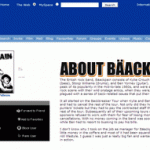Earlier in the week, I mentioned the Commons debate about MPs’ communications with their constituents – and mused on greater use of the internet for precisely that effect. So full marks to Tory MP Douglas Carswell, the member for Harwich (and Clacton).
Carswell is behind a new site, www.clactontv.com, which promises ‘to cover stories that interest you – using video clips made by you’. If, that is, you’re among the 102,028 people living in ‘Clacton, Harwich, Frinton, Walton, Jaywick, Holland-on-Sea, Dovercourt, Thorpe, Kirby and District.’
At first glance, you probably wouldn’t spot that the local MP was behind it; but glance at the footer, and you’ll see: ‘Douglas Carswell MP is responsible for this site, which is funded from the Incidental Expenses Provision of the House of Commons.’ The key to this is that it doesn’t mention his political allegiance, so it can be called ‘parliamentary’ in nature rather than ‘party political’… and therefore, it can be funded from his Commons allowance.
Early days, of course, with a few bits of placeholder text here and there (tut tut). But still some very encouraging signs. You’re invited to contribute your own video clips by email or DVD; there’s an RSS feed of all new clips, complete with iTunes tagging. There’s also a related forum site, talkclacton.com.
The site is produced by Politicos Design, using what looks like in-house JSP-based code. Like everything these days, the videos are being streamed using Flash – at a better-than-average resolution of 480×336. They’re using Politicos’ own servers, hosted by Positive Internet, rather than Youtube (etc). Personally, I’d have been inclined to use the free service, especially in the early days, and not just for reasons of cost: with a service like Youtube, there are well-established methods of including hosted videos in other pages. (You’ve probably seen me do it myself here a few times.) If you’re serious about harnessing the power of the community, why not let the community do some of the work?
Carswell’s main personal site is located at www.douglascarswell.com – and it, too, is funded from the IEP. Again, references to his Conservative Party allegiance are thin on the ground… but the front page offers ‘national news’, driven (I think) by the RSS feed of news stories from conservatives.com. One can’t help feeling that’s pushing the definition of IEP expenditure a bit. It’s clearly been a conscious decision not to push the Conservative branding… yet half the front-page content is pure Tory propaganda.
Carswell was one of the 23 Tories (along with leading blogger Iain Dale) behind ‘Direct Democracy: An Agenda for a New Model Party‘, published in June 2005 with a commitment to ‘making localism the core of the Conservative Party’s platform’.
